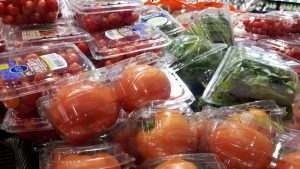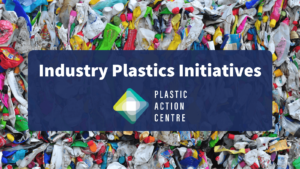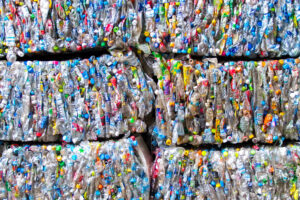Dove moving towards 100 per cent recycled plastic bottles, and plastic-free packs for its beauty bar
Dove announces new initiatives as part of its 2025 commitment to reduce plastic waste, which will see the brand avoid the use of more than 20,500 tonnes of virgin plastic per year globally:
- making its iconic beauty bar packaging plastic-free globally
- launching new 100 per cent recycled plastic bottles
- trialling a new refillable deodorant format that radically reduces plastic use
TORONTO, Oct. 28, 2019 /CNW/ – Dove, one of the largest beauty brands in the world, unveiled new initiatives and impact figures to accelerate the global beauty industry’s progress to address plastic waste. As one of the biggest known reduction plans of its kind in the beauty industry, Dove initiatives will generate an ongoing massive impact, reducing the use of virgin plastic by more than 20,500 tonnes per year globally. The amount of virgin plastic Dove will save per year would be enough to circle the Earth 2.7 times.1 The brand has opted for long-term initiatives rather than one-off limited editions to ensure a greater and sustained impact. The announcement will be a key contribution to achieving Unilever’s recently announced goals.
Plastic waste is one of the biggest perceived global environmental and human health issues we face today: an issue being driven by a linear, single-use consumption model. To be part of the solution in creating a circular plastics economy, one where plastics are reused and recycled, Dove is accelerating and expanding its actions with renewed force following the NO | BETTER | LESS PLASTIC framework:
1. NO PLASTIC: Dove is paving the way for the rest of the sector with industry-leading innovations – eliminating the use of plastics where possible by using alternative materials and new packaging formats. Next year, its iconic beauty bar single packs will be plastic-free globally,2 and development is underway to replace the plastic outer-wrap of its beauty bar multipacks with a zero-plastic material.
2. BETTER PLASTIC: Dove is committed to investing in more sustainable plastic choices to reduce the use of virgin plastic, supporting the creation of a circular economy for plastics. This includes today’s announcement that Dove will start to launch new 100 per cent recycled plastic (PCR) bottles where technically feasible, in North America and Europe by the end of 2019 – across all ranges (Dove, Dove Men+Care, and Baby Dove).3 Dove continues to search for solutions where recycled plastic is not currently technically feasible, including for caps and pumps.
_______________________________
1 The equivalence figure for the amount of virgin plastic bottles Dove will save is calculated on the basis of lining up Dove 16 FL. OZ/473mL bottles end to end.
2 Production timing pending on development test results.
3 There are only few exceptions within the whole portfolio that are not fully 100 per cent recycled bottles but still present a very high percentage in certain specific markets, and the plan is to achieve 100 per cent very soon. These exceptions are:
•
In EU, Dove bottles with MuCell technology will be at 97 per cent recycled plastic content by year end. Liquid hand wash, also with MuCell technology, will be at 97 per cent recycled plastic but we had to postpone the implementation to Q3 2020 as there is not enough reliable, good quality recycled polypropylene available to allow for 100 per cent application.
•
The self-foaming and liquid hand wash formats in NA will be at 78 per cent recycled plastic. We continue to explore possible options to move these products to 100 per cent.
3. LESS PLASTIC: Dove will leverage the technology behind its new reusable, refillable, stainless steel format deodorant sticks: minim™. This technology minimises waste by radically reducing the amount of plastic required. The launch date is not yet confirmed but work is well underway. minim™ will be trialled as part of the LOOP™ platform initiative: a first-of-its-kind, minimal waste, direct-to-consumer shopping system.
Sander Defruyt, New Plastics Economy Lead, Ellen MacArthur Foundation, says: “Better recycling alone will not solve the plastics problems we face today, we must address plastic waste at the source. This means eliminating the plastic items we don’t need, innovating the ones we do need so that all of them are reusable, recyclable, or compostable, and circulating all those we use by reusing them, or recycling them into new products and packaging. Action is needed now, and on all of these fronts in parallel. That is why we welcome Dove’s announcements. Their significant strides help reduce Dove’s use of virgin plastics and help to accelerate the global transition to a circular economy for plastics.”
Dove’s initiatives will contribute to Unilever’s recently announced new commitments on plastic:
To halve its use of virgin plastic, by reducing its absolute use of plastic packaging by more than 100,000 tonnes globally and accelerating its use of recycled plastic
To help collect and process more plastic packaging than it sells
The initiatives also build on Unilever and Dove’s long history of industry-leading action on plastic alternatives, including Unilever becoming a core partner of the Ellen MacArthur Foundation’s New Plastic Economy initiative and Dove avoiding the use of more than 10,000 tonnes of virgin plastic globally in the last decade.
Marcela Melero, Dove Global Skin Cleansing Vice President, explains: “At Dove, we believe in care that goes further for our consumers as well as our planet. We are passionately committed to being one of the brands making the biggest impact against plastic waste. We know we’re not perfect, but we can’t afford to wait. We’re working to have the biggest positive impact we can, as quickly as we can, and empowering others to do the same.”
Through a combination of alternative packaging materials, recycled plastic where needed, and investing in refill technology, Dove is driving the movement to create a new value for plastics and reducing the volume of plastic packaging it produces.
Richard Slater, Unilever Chief R&D Officer comments: “At Dove, we are proud to have more than 100 initiatives ongoing around the world dedicated to tackling plastic waste. But as one of the biggest beauty brands in the world, we have a responsibility to accelerate our progress even further. This announement is an important step in our work to transform how we produce, use and dispose of plastic packaging. By making this move, we aim to drive the global recycling industry to collect more waste plastic and make more recycled plastic available for use.”
________________________________
•
Deodorant packs are made mainly of polypropylene. Currently, there is not enough reliable, good quality recycled polypropylene available to allow for 100 per cent application. So, we have started with as much recycled plastic as we can incorporate, without negatively impacting the functional properties of the pack. The percentage of recycled plastic differs, depending on the structures (for example, sticks versus roll-ons) and the pack colours.
•
Certain types of colour-vignetted bottles in our Hair range in NA and EU where no technical solution yet exists, but we are exploring ways to make a similar move.
Dove are currently evaluating solutions to replace existing pumps and caps with 100 per cent recycled materials as part of the second phase of this initiative. At present, the 100 per cent recycled plastic commitment relates only to the bottle itself.
Dove is committed to leading the fight against plastic waste, and catalysing change within the industry and beyond. Through these initiatives, Dove calls for collaborative, accelerated action to help resolve the world’s plastic problem, shifting both commercial and consumer behaviour to turn the tide against plastic waste.



